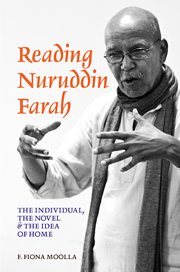Book contents
- Frontmatter
- Contents
- Introduction
- 1 Defining the Individual: Conceptual & Historical Limits
- 2 From a Crooked Rib & the Bildungsroman: Developing the Self, Developing the Nation
- 3 The ‘Gynocentric’ Bildungsroman: Sardines & Gifts
- 4 Modernism in A Naked Needle & Sweet & Sour Milk: Irony, Morality & the Aesthetic
- 5 Close Sesame & the Representation of Heteronomy
- 6 Dissolving the Boundaries of Self & Nation in Maps & Secrets
- 7 Reconstructing the Subject in the Third Trilogy: Links, Knots & Crosbones
- Conclusion
- Bibliography
- Index
3 - The ‘Gynocentric’ Bildungsroman: Sardines & Gifts
Published online by Cambridge University Press: 05 April 2014
- Frontmatter
- Contents
- Introduction
- 1 Defining the Individual: Conceptual & Historical Limits
- 2 From a Crooked Rib & the Bildungsroman: Developing the Self, Developing the Nation
- 3 The ‘Gynocentric’ Bildungsroman: Sardines & Gifts
- 4 Modernism in A Naked Needle & Sweet & Sour Milk: Irony, Morality & the Aesthetic
- 5 Close Sesame & the Representation of Heteronomy
- 6 Dissolving the Boundaries of Self & Nation in Maps & Secrets
- 7 Reconstructing the Subject in the Third Trilogy: Links, Knots & Crosbones
- Conclusion
- Bibliography
- Index
Summary
Autonomous personality development is so crucial to Farah's vision that Bildung is an element of most of his novels, even if the formation ideal is invoked only to be in some way challenged. Frequently, however, the challenge to autonomous development paradoxically affirms disengaged subjectivity. Baldly stated, all Farah's novels are Bildungsromane which, whether classical or dissensual, “naturalize and normalize” (Slaughter, “The Bildungsroman and International Human Rights Law” 1409-411) the disengaged self. Critics observe similarly that most of Farah's novels share some generic affinity with the detective novel, the narrative form constituted around the interrogation of a mystery which must be solved. These dual generic affinities may not counteract each other. The central mystery which Farah's oeuvre addresses is the question of identity – “Who am I?” – a question explicitly posed by the boy protagonist, Askar, in Maps. The question of identity, framed as an ontological question, cannot arise in non-modern cultures. In a non-individualist culture, as Charles Taylor notes in Sources of the Self, the question may be asked as a consequence of momentary amnesia. It might also be asked in the context of an anguished confession of a departure from a sacred or social ideal. In an individualist culture, however, the question is an index of a disengaged, interiorised self. The answer to the question, “Who am I?” in modernity, in the novel generally, and in Farah's novels in particular, is an answer which originates seemingly wholly from within the subject him/herself. The appeal, “Who am I?”, the quest and the fulfillment are all apparently wholly internal.
- Type
- Chapter
- Information
- Reading Nuruddin FarahThe Individual, the Novel and the Idea of Home, pp. 75 - 103Publisher: Boydell & BrewerPrint publication year: 2014



